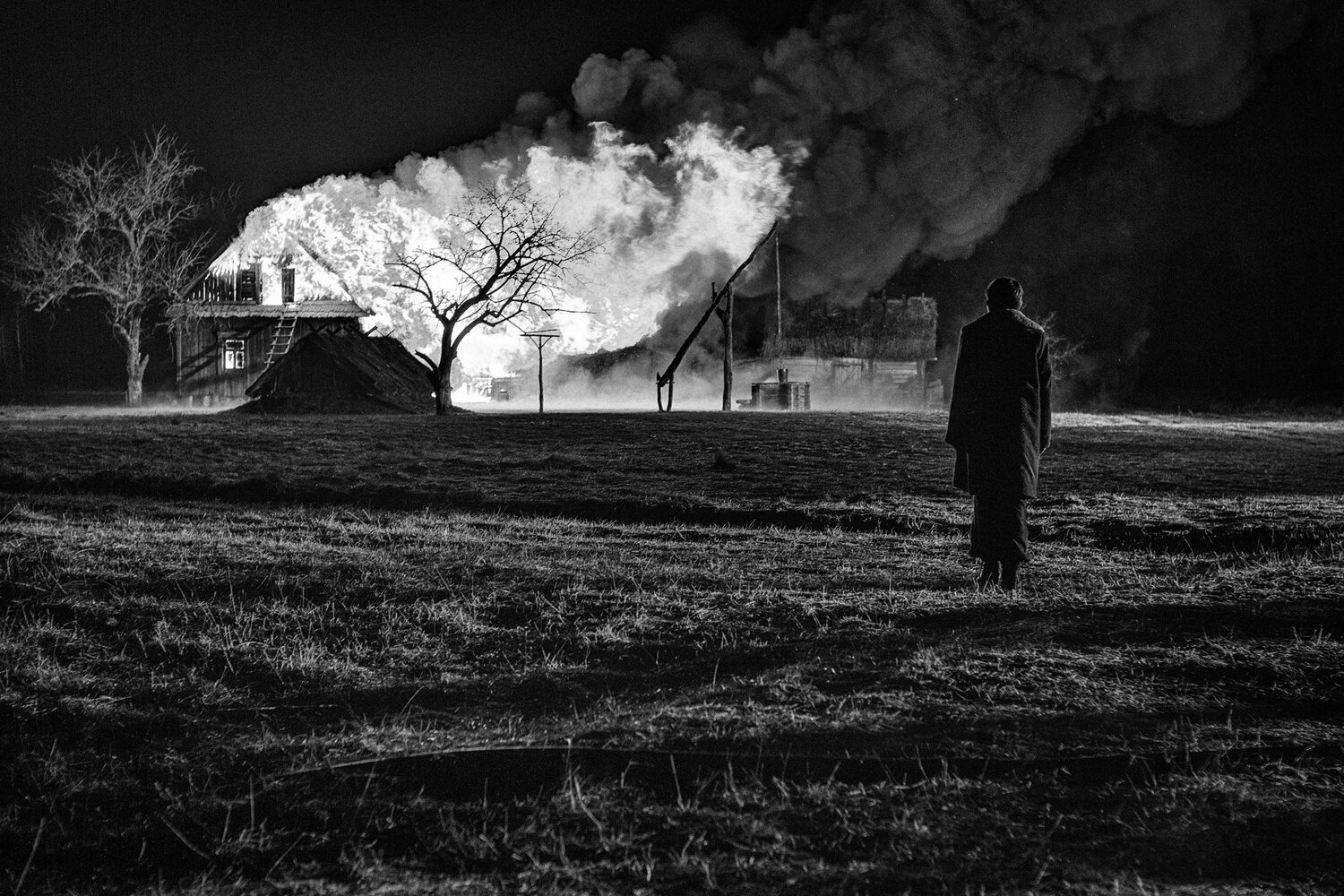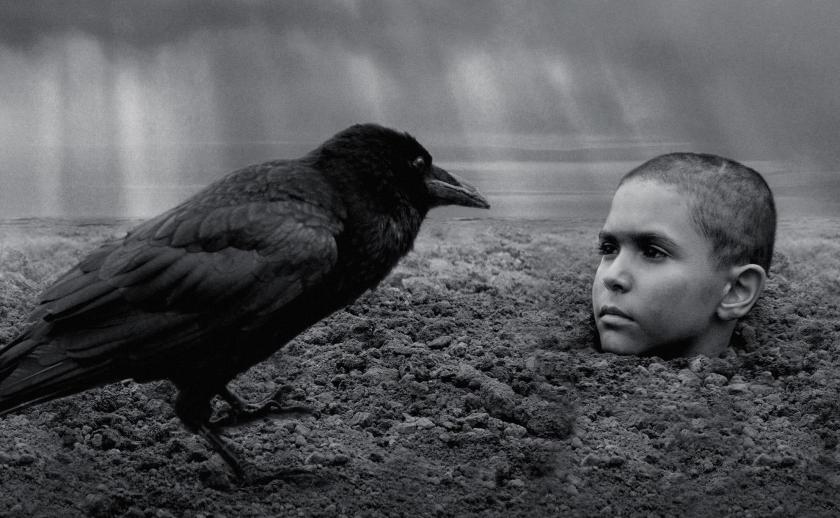Based on a novel by Jerzy Kosinski, The Painted Bird is an extraordinarily powerful chronicle of a young Jewish boy’s survival in Eastern Europe, the scene of some of the most terrible violence, inhumanity, and depredation during the Second World War. The Czech director Vacláv Marhoul worked on the project for more than 10 years. It's a labour of very dark love.
The child, separated from his parents, wanders through a horrific landscape, inhabited by peasants whose lives have barely changed since the Middle Ages, Soviet and Nazi troops ravaging the land as if possessed by all the most fiery gods of war, and occasional oases of Catholic bourgeois bigotry. Not a good place to be a defenceless Jew of around 7 years old, albeit a child whose cunning grows through every bloody humiliation and confrontation with the very worst of humanity.
The horror of the content aside, this is a stunningly beautiful film. The quality of the (black-and-white) photography and camera movement – by Vladimír Smutny – is remarkable: every shot framed with a perfect sense of composition, and a painterly use of natural and artificial light. Formally, the film is a masterpiece, as camera angles, tracking shots, depth of focus are used to maximise dramatic effect and create a series of deeply evocative moods. The film’s aesthetic is reminiscent of late Fifties and early Sixties art house cinema, as well as the work of Tarkovsky.

The acting is excellent throughout. The international cast includes Harvey Keitel, Udo Kier, Stellan Skarsgård and Julian Sands. The boy – an unforgettable performance by Petr Kotlár – is confronted, time after time by extraordinary cruelty: he is beaten more than once, buried in earth up to his neck and savaged by crows, thrown into a pool of human excreta, and worse. He also witnesses terrible brutality, vindictiveness and sadism, in a world, as a relatively more benevolent Soviet sniper tells the boy – where justice is about “an eye for an eye, and a tooth for a tooth”. A miller (spine-chiiling Udo Kier) who takes the boy in, is driven to jealous insanity by an apprentice whom he imagines lusts after his wife: the crazed miller gouges the younger man's eyes out with a spoon, as the child and wife watch. This would be shocking enough on its own, but the writer and director Vacláv Marhoul allows a floor level camera to film the violently extracted eye-balls in big close-up, as a cat playfully kicks them around with his paw.
This is never grand-guignol horror, but barely human behaviour treated with the utmost visual flair and a formal brilliance that's repeatedly breath-taking. And yet, I felt disgust at times, and and ambivalence about the literal treatment of the bestial violence. The film is nearly three hours long, with little respite from the horrors of war that the child faces on his seemingly interminable journey. Questions linger in my mind: is the depiction of horror in the film ever gratuitous? Is “the act of seeing with one’s own eyes”, as US experimental film maker Stan Brakhage named his 1971 film, all in very big close and in colour, of an autopsy, something we must experience? Or should we tread more subtly, as the ancient Greeks did, allowing the audience to imagine atrocities off stage, rather than shove them in the audience’s face?
The territory that Kosinski and Marhoul evoke in The Painted Bird is a place where many millions were killed in the years between 1917-1948. And the horror was relentless, almost unimaginable. The film inhabits the "bloodlands", as historian Timothy Snyder described them in his monumental 2010 book of the same name, and to be faithful to the easily avoided facts, it needs perhaps to dwell on the horror. I remembered, after watching the film a second time, reading in Philippe Sands’s excellent “East-West Street”, an account of the massacre of Jews in Lviv in 1941. And later discovering online a series of horrifying photographs taken by German soldiers: they showed in graphic detail how Ukrainians of the city tore the clothes off Jewish women, dragged them through the streets, as onlookers cheered. They did far worse before the victims were taken to be shot in the forest nearby.
These works of memory are essential, and we shouldn't shrink from evoking and documenting them, even if they leave us feeling sick at heartSon of Saul the 2015 film by László Nemes, also came to mind: an extraordinary film evokes the horror of Auschwitz without ever coming close to the slight flavour of voyeurism that runs through The Painted Bird. I recalled as well my feelings on recently finishing Sarah Helm’s magisterial and unflinching account of the women’s camp Ravensbrück (If This Is a Woman, 2016), a place of unmentionable sadism and suffering, and yet selfless heroism and love as well. These works of memory are essential, and we shouldn't shrink from evoking and documenting them, even if they leave us feeling sick at heart. Marhoul treads the same necessary path, but in a different way.
There's a backstory to this screen adaptation. The Painted Bird was originally marketed as a largely autobiographical book. Kosinski claimed to have experienced the terrible things he wrote about, the events we see depicted in the film. It turned out that he hadn’t – and that, rather than being persecuted by Poles and Ukrainians, his family had been taken in at great risk by a Polish Catholic family and hidden for the length of the war. It turned out that the stories were mostly or all genuine, and that Kosinski had heard from survivors. Historical records and witness accounts make it clear that none of the atrocities depicted in The Painted Bird go beyond what was actually done during the war. Marhoul's film is fictionalised yet totally authentic in spirit. If anything it is a good deal less horrific – not least in terms of scale – than what the "bloodlands" lived (and died) through.
If seeing the film raises questions and creates a great deal of unease, that’s surely inevitable, as the subject matter is all too "real" and such horror is as uncomfortable as it gets. The violence and sadism within humanity is a constant. The few acts of kindness the boy encounters on his journey throuh hell are short-lived and mostly snuffed out by further horrors. Marhoul has made an extraordinary and very brave film. I may not be alone in finding it difficult to decide whether his graphic yet aesthetic depiction of inhumanity goes too far. His is a dark vision, but one which we must contemplate, if we are to face up to the depths of the potential bestiality that fester in our hearts.
- In cinemas and digitally from 11 September
- More film reviews on theartsdesk















Add comment